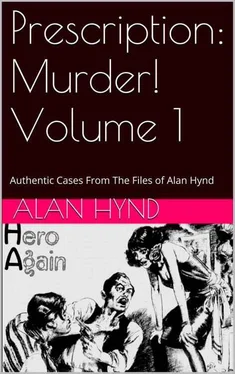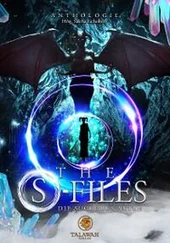“There,” he said, “you’re all fixed up — for the time being. I’ll be wanting to take another look at you,” he said. “I’ll drive out to your place some night next week. How’s that?”
Carrie Sparling was a woman who was no longer used to being looked at and didn’t mind the renewed attention. Her husband, John Wesley Sparling, always crowded the entire family into a buggy and hauled them off to church on Sundays, whether they wanted to go or not. He was fifty years old. Like many deeply religious men, he neither smoked nor drank but was a great believer in the propagation of the race. In the past, he had taken a good look, and then some, at his wife on an average of once a year, because he had four sons — Pete, Albert, Scyrel and Ray — whose ages were 24, 23, 21 and 20. (Something had apparently gone wrong during one of those years). Every Sabbath after church, the family, who were terrific eaters, fell on a gargantuan meal. The four Sparling boys were husky fellows with tree-trunk legs, brawny arms and barrel chests, but not too bright in the second story. Farm chores, heavy as they were, weren’t enough for the four Sparling boys. Instead of relaxing after the sun went down, they repaired to a sort of gymnasium on the upper floor of the barn and practiced weight lifting, chinned the bar and cavorted on the exercise rings until late at night.
Four days after Mrs. Sparling had dropped into Doctor MacGregor’s office, the handsome physician drove onto the Sparling farm. Mrs. Sparling had already told her husband and her sons what a fine man the doctor was, so Righteous-John and the boys gave the doctor a hearty welcome.
Doctor MacGregor, a very conscientious practitioner, didn’t seem to be in a hurry, and began looking around for a place in which to examine Mrs. Sparling’s eye. He examined first one room, then another, and finally settled on a bedroom on the second floor.
“Just come upstairs with me,” he said to Mrs. Sparling, and, while Righteous John and the four boys sat around the parlor, the good doctor and Carrie Sparling went upstairs. The doctor and the patient didn’t come downstairs for almost an hour. The doctor looked a little mussed up and Mrs. Sparling appeared to be flushed, one of the boys recalled to a friend later.
“We had quite a time,” said the doctor, a truthful man, “but everything seems to be fixed up. For the time being anyway.”
During the next several months, Doctor MacGregor managed to be in the neighborhood often. Although Mrs. Sparling’s eye trouble didn’t seem to get any worse it didn’t seem to clear up completely, either. Sometimes the doctor would stay for supper and take potluck with the family. Occasionally he would remain for the whole evening, leaving an office full of patients sitting around wondering where he was.
Doctor MacGregor observed, during the nightly sporting events in the barn, that the Sparling boys swigged great quantities of drugstore tonic. Most of the stuff contained a stout percentage of alcohol, as well as a small quantity of arsenic, not unusual for the day of unregulated medicines. Thus it was possible for a so-called teetotaler, if he didn’t mind the bitter taste, to get half crocked.
MacGregor’s closest friend was a young attorney in the town of Bad Axe, a few miles from Ubly and the seat of Huron County. His name was Xenophon A. Boomhower. MacGregor and Boomhower, with their wives, used to visit each other at night, and, after cards and refreshments, swap shoptalk.
“You know, Xenophon,” MacGregor said one night, “I’m worried about Mr. Sparling.”
“Righteous John Sparling? Why, he looks like he’ll live to a hundred,” said Boomhower.
MacGregor shook his head. “That’s just it. He’s like an apple that’s healthy on the outside with a malignant worm inside.”
“Meaning what?” asked Boomhower.
“Meaning that John Wesley Sparling,” Doctor MacGregor explained, “might be suffering from Bright’s disease. That would be my guess.
Bright’s disease, as it was known at the time, was a fatal kidney ailment of the day, involving a serious inflammation and malfunction of that organ. In the day, Ty Cobb suffered from it, though he survived it, as did Bram Stoker, author of Dracula, who died from it. To be diagnosed with it, was more likely than not, to receive a death sentence. Nonetheless, the good Dr. MacGregor put Sparling Senior on some medications.
But inevitably, one day in June, less than six months after MacGregor had first taken a look at Mrs. Sparling, the righteous farmer with the long black beard did something most unusual. He quit his work in the fields in the middle of the day and took to his bed. Pete, the eldest son, hustled over to Ubly to summon the doctor.
MacGregor drove down to the Sparling farm every morning and every night after that to minister to the patient, who seemed to have trouble keeping any food in his stomach. While Righteous John was in bed, the Sparling faun received a second visitor, a loud, belligerent little man of seventy, who lived near Ubly. He too was named John Sparling.
The visitor, however, was known as Old John. He was an uncle of Righteous John, a former State Senator and, in his earlier days, a renowned auctioneer. He was still a spry little character, and his vocal apparatus was mercilessly unimpaired, so that, when he spoke in his auctioneer’s voice, he could be heard practically in the next county.
On this day when he came to visit his nephew, after having heard he was seriously ill, the four boys were out in the fields, so Old John went right up to Righteous John’s bedroom. Righteous John was in no shape to receive a visitor, or even talk to one, since he was in a semi-conscious condition and practically on fire with fever.
Old John thereupon began a prowl of the house for Carrie Sparling. When, at last, he had looked everywhere for the lady except in her bedroom, he decided to try there.
Old John was used to barging through houses and opening doors without knocking — a carry-over from his auctioneer days — and so when he approached Mrs. Sparling’s bedroom he just turned the knob of the door and kept on going.
But the door was locked and Old John; moving too fast to stop, crashed into the door and shook himself up. When the door opened there stood the doctor and the farmer’s wife. Old John measured Mrs. Sparling and the doctor and walked away.
A few days later, Righteous John Sparling died. Old John was at the graveside. When the coffin was being lowered, he exploded.
“There’s somethin’ danged funny about why my nephew died!” he yelled.
“Danged funny! You all hear?”
Folks were in the habit of ignoring the old windbag, however. And they did again this day as they had in the past.
A few months after the head of the Sparling household had gone to his reward, MacGregor, looking to the future, decided it would be a good idea if the four boys took out some life insurance.
“But we’re all as healthy as can be,” said Pete, now the nominal head of the house.
“You never can tell by appearances,” said MacGregor. “Take your father. Look what happened to him.”
“You’ll do as the good doctor says,” said Mrs. Sparling. “He’s going to examine all of you for insurance policies and then we’re going to buy insurance.”
Conveniently, the doctor’s father, Alexander MacGregor, was an insurance agent in London, Ontario. The Doctor examined applicants for policies in his father’s company. A few weeks later, policies of $1,000 on each of the four boys with the Sun Life Association of Canada came across Lake Huron from the offices of Doctor MacGregor’s father.
It was a lovely night in the spring of the following year. The good doctor and his wife were spending an evening with their friends the Xenophon Boomhowers. Everybody was in good spirits except the doctor. He was depressed.
Читать дальше












